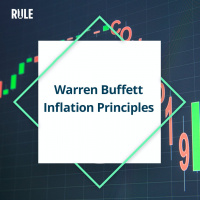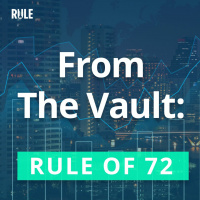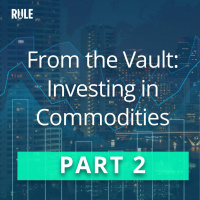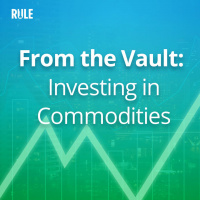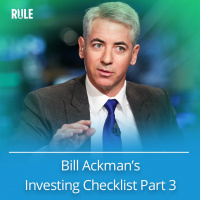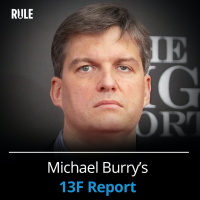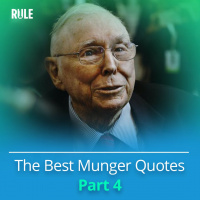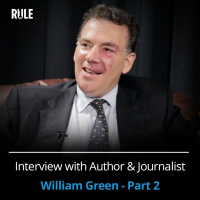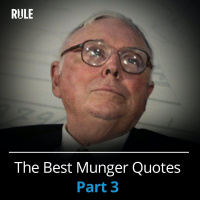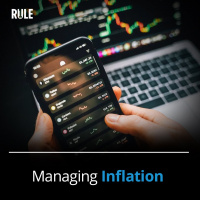Sinopsis
Phil Town is a hedge fund manager and author of 3 New York Times best-selling investment books, Invested, Rule #1, and Payback Time. On the InvestED podcast, Phil and his daughter Danielle shine a light on the successful investing strategies that gurus like Warren Buffett have used for 80 years. Listen in for a great stock market education on basics, learn how to invest on your own, and follow along with real-time examples and investing tips from week to week. Subscribe and leave a review. Questions? Email questions@investedpodcast.com.
Episodios
-
337- Checklist Inversion
05/10/2021 Duración: 39min“Invert, always invert” — Charlie Munger If you want to really be a great Rule #1 investor, you must have an investing strategy in place to help guide you. You must create a story for the company you want to invest in and determine why this is a great company. Once you have that story, invert it by flipping to the opposite point of view. You should try to create the argument that this investment isn’t the best idea, and if you can’t, then that is a sign that you don’t know enough about the company yet. So, as a part of your Four Ms checklist, one of the last steps is to invert. When you apply inversions to buying a business, there are four key reasons to look at: You have a serious inversion for every key reason to own the business You know every reason not to buy a company, better than the short sellers For every inversion, you know a solid rebuttal that erases the inversion Short sellers are wrong! In this podcast, Phil & Danielle cover why it’s important to invert along with four key things to
-
336- Investing Checklist Takeaways
28/09/2021 Duración: 14minIf you’re doing it right, investing in the stock market is much more than picking a few companies, buying a few shares, and hoping for the best. Smart investors are those that are disciplined and have an investing strategy in place to help guide them as they go along with their investment choices. And that includes having a checklist to help you make important investing decisions. Rule #1 investors like to use the Four Ms checklist. They tie into the strategy of, “Buying wonderful businesses at attractive prices” and are important to consider when investing your money for the long-term. “Wonderful” indicates that any business you invest in strongly meets the criteria of three of the Four Ms: Meaning: You understand the business enough to want to own the whole thing if you could, that you’d be proud to own it, and that it reflects your values. Moat: The business must meet certain criteria in terms of financial strength and predictability, creating a symbolic Moat to surround and protect it from competito
-
335- Rule #1 Event Checklist - Part 2
21/09/2021 Duración: 33minWhy do stock market events cause stocks to go on sale? Let’s say that cotton prices start to go nuts because of the Arab Spring. Maybe they’re not going to harvest Egyptian cotton crops, so cotton prices go from $1 to $3. The guys who own companies that depend on cotton prices to be low look at the price and say, “Oh no. It’s going to take over a year before cotton prices come down, I need to get out of this company.” This happens even if there isn’t anything wrong with the company, it’s just going to have a bad year. That company could go from $45 to $15 simply because there are no big buyers. They all get out of the company on momentum. This is what causes stock market prices to change. So, how do Rule #1 Investors take advantage of stock market events? Rule #1 investors buy for the long term. They wait, and when they see something that’s on sale because the big guys have sold it off, it takes them just a few seconds to get in there and take advantage of these stock market events. In this episode of th
-
334- Rule #1 Event Checklist
14/09/2021 Duración: 38minThe key to finding stocks on sale is to wait for a Rule #1 event. What’s a Rule #1 event? It is when something happens that affects the entire market and makes the stock price of a good company drop far below its real value. This could be a recession, a pandemic, an election — you name it. Remember, the stock price doesn’t reflect the actual value of the company. We know that the company’s price will bounce back in time, and because we take a long-term approach to investing in stocks, we aren’t worried. During an event, when others are panicking, we can take advantage of the downturn and buy wonderful companies at a tremendous discount. This is why it’s so important to have your watchlist of wonderful companies ready to go. When you do, you can just sit back and wait for a Rule #1 event to temporarily lower the price of the stocks on your watchlist, and then BUY. When the company recovers from the event and returns to its previous price, your investment could double. In this episode of the InvestED p
-
333- Invest in What You Love!
08/09/2021 Duración: 38minWhen it comes to investing, conventional wisdom says to hand your money over to a financial advisor and let them diversify your investments for you. Why think too much about where your money is going if you don’t have to? But there’s a problem with that mindset: your values matter and you should be investing in what you love. Consistently pouring your life and efforts into the things you care about — that matters. As much as 85% of the stock market is controlled by small investors. Imagine the impact those small investors could have if they invested based on their passions and values, rather than the values (or just the blind greed) that drives financial institutions’ investment decisions. You can choose to invest in whatever you want and wherever your passions lie. And the great thing about it is that everyone values something different. Invest in stocks that you value. If you’re not sure what your values are, it’s time to step back and do a little searching. In general, it might make sense not to inves
-
332- Warren Buffett's Inflation Principles
01/09/2021 Duración: 25minIn today’s episode, we discuss some words of wisdom shared from the letters of Warren Buffett. There is one concept in particular that we can take from these letters that still applies today, and that is inflation. First, we focus on Warren Buffett’s 1979 letter, where inflation rose to 11.2% in the United States. Buffett decided to write about this in the letter along with larger financial issues in the macro-economic world. He starts by telling other investors that we do not know what will happen with the stock market or the underlying currency. Long-term fixed interest bonds may not continue to serve as a financial instrument and may even become obsolete. Warren Buffett also points out that there’s no corporate solution to the problem of growing inflation. As currency becomes more worthless, companies do not have a solution to this problem - they just have to do their best. As we fast forward to the early 1980s, Warren Buffett writes some solutions to these types of problems. First, choose an investme
-
331- From the Vault: Rule of 72
24/08/2021 Duración: 39minThe Rule of 72 is a simple equation to help you determine how long an investment will take to double, given a fixed interest rate. It’s a shortcut that you, as an investor, can use to estimate if an investment will double your money quickly enough to be worth pursuing. When you see how quickly your money can double, you’ll understand the power of compound interest. Compound interest is what makes you wealthy over time; the longer your money is invested, the more it grows. But, how? As you earn interest on your initial investment, those earnings are added to the initial amount while earning interest. This produces more earnings, which can then be reinvested as well. It’s a powerful cycle that can lead to incredible growth. The Rule of 72 paints a picture of how quickly your money can grow without any additional investment on your part. You don’t need a special ‘Rule of 72’ calculator to figure out this equation — it’s easy. Simply divide 72 by the fixed annual rate of return and you’ll know how many
-
330- From the Vault: Investing in Commodities - Part 2
17/08/2021 Duración: 41minPhysical commodities are investments that you can physically own, such as gold, silver, natural gas, and oil. Take gold, for example. The price of gold rises and falls, depending on the demand. Demand tends to go up only when people are feeling afraid or uncertain about the future. The problem with investing in gold is that you can’t accurately predict what the demand will be at any particular time. That makes investing in gold more like gambling than like smart investing. If you really want to learn how to invest the smart way, it takes a good amount of due diligence and patience but the long-term payoff is worth it. By following smart investment practices that have made people like Warren Buffett extremely wealthy, you may not make money fast, but you have the potential to make more of it. Warren Buffett started with a small amount of money too, and he turned it into $30 billion. This goes to show that it isn’t about the money you have, it’s about the knowledge you have. In this vault episode of the
-
329- From the Vault: Investing in Commodities
10/08/2021 Duración: 40minPhysical commodities are investments that you physically own, such as gold, silver, natural gas, and oil. A commodity stock has several key attributes: Its products compete primarily on price, but it is not a low-price competitor. Its products are the same as another company’s products. It has no brand identification. It can’t raise its prices with inflation or increasing costs. Let’s take gold for example. The practice of investing in gold goes way back, but that doesn’t necessarily mean it’s a great investment. Gold’s price is based on scarcity and fear, which can be impacted by political actions or environmental changes. If you are investing in gold, be aware that your protection against a price drop, your moat, is based on external factors so the price can fluctuate a lot, and quickly. The price tends to go up when scarcity and fear are abundant and down when gold is widely available and fear is abated. If you think the world is going to be a more fearful place in the future, then gold coul
-
328- Valuation Checklist
03/08/2021 Duración: 33min“Sticker price is what I call the value of the business.” — Phil Town Why does Phil call it the Sticker Price? You know how you have a sticker on the window of a new car and it tells you what the price of the car is, and you never pay the Sticker Price? That’s why we named the value of the business the “Sticker Price.” Rule #1 investors never pay the Sticker Price. They always want to buy it at a significant discount to its true value. How do you find the Sticker Price? That’s the critical part of this whole equation of understanding what businesses to buy. First, you have to make sure it’s a business that you understand the meaning of. You understand it has a big, durable moat and it has a great management team. Now you can start looking for the value. Next, in order to evaluate the Sticker Price you want to find the Future Growth Rate, the P/E Ratio, and your Minimum Acceptable Rate of Return. The Future Growth Rate is always an estimate, the other numbers you can find on financial statements and plug t
-
327- Phil’s Investing Checklist Review
27/07/2021 Duración: 31minWarren Buffett said, “Be certain,” and here’s how you’re going to be certain. If you buy a wonderful business at an attractive price, you’re certain to make money. It’s essentially like buying a $10 dollar bill for five bucks. You focus on a couple of key things to make sure you know what you’re getting. So, what is a wonderful business? A wonderful business is understandable, and we’re passionate about it. We call that the meaning of the business. It’s durable, we call that the moat. Like the water around a castle protects it from attack. The CEO is honest, passionate, and owner-oriented, and we call that management. Those are the first three M’s. We make sure that we understand all three M’s before we go forward, then we look at the price. Ben Graham, who taught Warren Buffett how to do this said, “The three most important words in investing are margin of safety”. The margin of safety is a measure of how “on sale” a company’s stock price is compared to the true value of the company. You need to be a
-
326- Bill Ackman’s Investing Checklist Part 3
20/07/2021 Duración: 32minWilliam Albert Ackman is an American investor and hedge fund manager. He has a well-known 8-point investing checklist, which is straightforward and reflects the basic principles of Rule #1 Investing. That checklist includes only investing in simple and predictable businesses with a dominant market position, limited risk, a strong balance sheet, excellent management, high return on capital, free cash flow generative, and large barriers to entry. Sound familiar? There’s a lot of talk in the financial community about “diversification,” which simply means investing your money in a variety of ways in order to provide a safety net should one investment go south. The thing is, you don’t need to diversify if you know how to invest and understand what you are investing in. By taking the time to research and learn about the companies you are investing in, you are providing your own safety net, because you won’t invest in any company that doesn’t meet the standards for a wonderful company, as it is defined in Rule #
-
325- Michael Burry’s 13F Report
13/07/2021 Duración: 36minMichael Burry is an American investor, hedge fund manager, and physician. Burry is one of the most renowned names in the hedge fund industry, managing over $1 billion in assets. Michael Burry has been in the news recently after regulatory filings revealed that he had PUT options on more than 800,000 shares of Tesla (TSLA). There has also been information released on which stocks he plans to sell, including The Allstate Corporation (ALL), Discovery, Inc. (DISCA), The GEO Group, Inc. (GEO), and Ares Capital Corporation (ARCC). But what can people do with this information? Coattailing is a popular technique in investing. When you use coattail investing strategies on some of the best investors, you’re essentially looking and copying the people who we know have made enormous rates of return over 20 and 30 year periods of time. Some examples of these types of investors are Michael Burry, Charlie Munger, Warren Buffett, David Einhorn, and Bruce Berkowitz. So, how can you coattail the best investors? Investor
-
324- From the Vault: Is an “Event” Required?
07/07/2021 Duración: 36min“I don’t mind not making money on something that I’m not sure about.” - Phil Town If a company has never had an event but appears to be on sale, is it a good investment? Meeting the requirements of the Four Ms and the Big 5 Numbers just proves that a company is worthy of being on your watchlist, but doesn’t give you the green light to buy just yet. As Rule #1 Investors, we want to buy wonderful companies, yes, but only when they are at the right price. That’s why the last step is to wait patiently to buy stocks when, and only when, they go on sale. Buying a stock on sale helps take the risk out of investing and makes it easier to get fantastic returns. The key to finding stocks on sale is to wait for a Rule #1 event. A Rule #1 event is when something happens that affects the entire market and makes the stock price of a good company drop far below its real value. This could be a recession, a pandemic, an election, you name it. Remember, the stock price doesn’t reflect the actual value of the company. We
-
323- The Best Munger Quotes - Part 4
29/06/2021 Duración: 30min“We both (Charlie Munger and Warren Buffett) insist on a lot of time being available almost every day to just sit and think. That is very uncommon in American business. We read and think.” ― Charles T. Munger This further proves the point that reading is so fundamental to being an investor. Start with what you know and with what you love. If you don’t understand a business as if you owned the company, stop and move on to the next company. This is the most important, and perhaps the easiest to overlook, part of Rule #1 investing. When you think of buying stocks, think of it as purchasing the entire business. Once you find a business that you love, your next step is to research the company inside and out, by reading 10-K reports and any articles you can get your hands on. You can start by thinking about all of the things you are talented at, and make a list. This can be things like running, playing piano, creative writing, and more. Next, think about where your passions lie. Maybe you love reading, seeing
-
322- Interview with Author & Journalist William Green - Part 2
22/06/2021 Duración: 35minWilliam Green is a journalist and author of Richer, Wiser, Happier: How the World’s Greatest Investors Win in Markets and Life. Over the last quarter of a century, he has interviewed many of the world’s best investors, and has written for many leading publications in the US and Europe, including The New Yorker, Time, Fortune, Forbes, Barron’s, Fast Company, Money, Worth, Bloomberg Markets, The Los Angeles Times, The Boston Globe Magazine, The New York Observer, The (London) Spectator, The (London) Independent Magazine, and The Economist. In Richer, Wiser, Happier, William Green draws conclusions on interviews that he’s conducted over twenty-five years with many of the world’s greatest investors. As he discovered, their talents extend well beyond the financial realm and into practical philosophy. The best investors in the world try to stay intensely rational. They try to get emotion out of their decisions and stick to the facts. As an investor, you must ask questions but also do the homework. You'll l
-
321- Interview with Author & Journalist William Green
15/06/2021 Duración: 54minWilliam Green is a journalist and author of Richer, Wiser, Happier: How the World’s Greatest Investors Win in Markets and Life. Over the last quarter of a century, he has interviewed many of the world’s best investors and has written for many leading publications in the US and Europe, including The New Yorker, Time, Fortune, Forbes, Barron’s, Fast Company, Money, Worth, Bloomberg Markets, The Los Angeles Times, The Boston Globe Magazine, The New York Observer, The (London) Spectator, The (London) Independent Magazine, and The Economist. In Richer, Wiser, Happier, William Green draws conclusions on interviews that he’s conducted over twenty-five years with many of the world’s greatest investors. As he discovered, their talents extend well beyond the financial realm and into practical philosophy. The most successful investors are iconoclasts who question conventional wisdom and profit vastly from their ability to think more rationally, rigorously, and objectively. But this is easier said than done when y
-
320- The Best Munger Quotes - Part 3
08/06/2021 Duración: 35min“Spend each day trying to be a little wiser than you were when you woke up.” — Charlie Munger That assertion is so powerful, but it’s easy to overlook how critical it is. The whole idea of Rule #1 Investing is researching and learning about companies that you love, and buying stocks at attractive prices. Part of researching a company is ensuring it has a margin of safety, good management, meaning to you, and lastly, a moat — or competitive advantage. Let’s focus on moat, for example. Charlie Munger loves Coca-Cola. He said that “Coca-Cola is the perfect business because it has this gigantic durable competitive advantage, or moat, which gives it predictable cash flow.” This allows us to figure out what the future cash flow will be and value the company today, so we know whether we can buy it on sale or not. Your job as an investor is to research industries you already understand, so you can recognize companies with strong moats. An example of a brand moat is Harley-Davidson’s notorious lifestyle branding. T
-
319- The Best Munger Quotes - Part 2
01/06/2021 Duración: 31min“We recognized early on that very smart people do very dumb things, and we wanted to know why and who, so we could avoid them.” — Charlie Munger The best investors in the world use the same principles. They have been around since the 1930s and they are still practiced today by the best investors in the world, including Charlie Munger, Warren Buffett, David Einhorn, and Mohnish Pabrai. One of those principles includes staying intently rational. But this is easier said than done when you are investing real money. Money you can’t afford to lose tends to be “hot” or emotional. Pro gamblers try to avoid sitting down with more than they can lose, but anyone investing all of their own hard-earned money is always sitting down with more than they can lose. Fear of losing more than you can afford to lose tends to make the mind go irrational. You start guessing. A way you can stay rational in uncertain times is to understand what companies you’re buying as if they were your own. Stick with what you know, and realiz
-
318- From the Vault: Inflation Kills!
25/05/2021 Duración: 24minInflation is the devaluation of a currency’s buying power. It occurs over time as the government pumps money into the economy and there’s a larger money supply buying a relatively fixed amount of stuff. Let’s say you’re 50 years old. You want to retire in 10 years at age 60 - we’ll figure 30 years in retirement and you’re putting money into a 401(k). Let’s assume you started with $100,000 today in your 401(k) and then contributed $2,000 a year into it because you’re putting your kids through college and that’s all you can put away. In 10 years, you would expect to make around 6% in your 401(k) (if your employer isn’t matching your money). A reasonable inflation rate is probably going to be about 3%. What this means is that in 10 years, when you’re ready to retire, at 6% with an inflation rate of 3%, you end up with $205,000 to retire on. Let’s assume that you’re going to live on $50,000 a year. You’ve got $205,000 right now, but 10 years from now it won’t be worth that at all. Inflation affects everything






